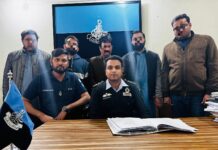
ISLAMABAD, Jul 19 (APP):Prime Minister’s Special Representative for Interfaith Harmony and Middle East Hafiz Tahir Mehmood Ashrafi has issued protocols to keep law and order in Muharram-ul-Haram after holding a thorough consultation with the leadership of various schools of thoughts on Tuesday.
Ashrafi who is also the chairman of Pakistan Ulema Council said the protocols were being issued in the light of Paigham-e-Pakistan to avert any untoward situation particularly in the holy month of Muharram.
He said the PUC was in coordination with the leadership of all schools of thought and making endeavours to implement the following ‘code of conduct’ at every respective forum in letter and spirit.
He informed that a meeting of Muttahida Ulema Board (MUB) was also being called on July 24, in Lahore adding the leaders of PUC and MUB would pay visits in important cities in that regard.
According to the main points of standard operating procedures, sectarian hatred, armed sectarian violence and practices of imposing one’s ideologies on others through force and coercion is contrary to the rules of Islamic Shariah and fanning anarchy and chaos is a national crime.
Religious scholars, Ulema, Mashaykh and Muftis of all sects decline negative thinking leading to extremism completely.
It is dutiful to observe the sanctity of the Prophets of Allah, Companions and wives of the Holy Prophet Muhammad (Peace Be Upon Him), and Ahl al-Bayt. The person who violates and blasphemes these sacred things is condemned by all schools of thought, and the law should take immediate action against such a culprit.
The usage of foul and abusive language against the faithful and adherents of different religious sects is Haraam (forbidden). The religious scholars, Ulema and Mashaykh from across the country has declared their dissociation from such elements.
Using religious rites and sloganeering for private armed purposes and achieving armed power is definitely not right as per Quran and Sunnah.
It is the duty of Ulema and Mashaykh and religious scholars to educate people about the distinction between right and wrong while declaring someone as an infidel (Takfir) is the jurisdiction of the state, which will be determined in accordance with the Islamic Shariah.
All non-Muslim citizens have full right to worship and are allowed to practice their religious rituals in their worship places on the occasion of their festivals. The rights given to non-Muslims by the Constitution cannot be usurp by any individual, group or party and organization.
It is not permissible to kill non-Muslims living peacefully in the Islamic state, but it is a sin. It is the responsibility of the state to punish those who violate the Constitution and laws of the land.
According to Islam, it is important for everyone to respect women and protect their rights. As per Islamic Shariah, women should be given their due rights in inheritance and provision of education.
The soil of Pakistan is the sacred trust of Allah Almighty, so its use for any kind of terrorism and extremism is not permissible and we all renounce any affiliation with all such elements.
Participating in any proscribed organization’s activities against the state of Pakistan or assisting or supporting it in any way is illegal and against the Shariah under any circumstances.
Any terrorist activity against the government or security institutions falls under the category of sedition, which is completely forbidden in Islam. We pay tribute to the armed forces for their precious sacrifices rendered for the security and sovereignty of the state and nation.
It is the discretion of the Islamic state to initiate the aspect of Jihad.
Use of power in the name of enforcement of Shariah, confrontation, sabotage, and terrorism are prohibited in Shariah.
The meeting of PUC’s central executive committee was chaired by Hafiz Tahir Mahmood Ashrafi and attended by Maulana Asad Zakaria Qasmi, Maulana Noman Hasher, Maulana Muhammad Shafi Qasmi, Maulana Asadullah Farooq, Allama Zubair Abid, Allama Tahirul Hasan, Maulana Obaidullah Gormani, Maulana Muhammad Ashfaq Patafi, Maulana Tahir Aqeel Awan, Maulana Aslam Siddiqui, Maulana Aziz Akbar Qasmi, Maulana Muhammad Aslam Qadri, Qari Shamsul Haq, Maulana Mubashir Rahimi, Qari Asmatullah Muawiya, Maulana Aminul Haq Ashrafi, Sahibzada Hamza Tahirul Hasan, Sahibzada Izharul Haq, Fahad Butt, Maulana Abdul-Rauf, Qari Hafeezullah, Maulana Zubair Khatana, Maulana Aqeel Zubiri, Maulana Abdul Ghaffar Farooqi, Mufti Umar Farooq, Maulana Abu Bakr Hameed Sabri and other prominent religious scholars.